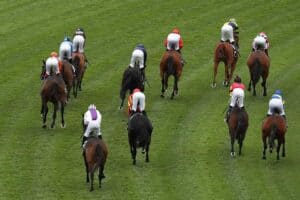Postponing the 2020 Durban July from its traditional slot on the first Saturday of July to the last Saturday has prompted an array of questions about the great race. One being, has this happened before?

The answer to that is “yes” – and quite recently. The 2010 July was shunted to the end of the month to avoid clashing with the Fifa World Cup in South Africa.
One of Fifa’s conditions for staging the football spectacle is that no host cities can have rival attractions queering its pitch. The Durban city council and racing operator Gold Circle were happy to comply and the fateful date became July 31 for a single year.
Master trainer Mike de Kock held a freakishly strong hand at Greyville that day, saddling seven of the 20 starters, including 33-10 favourite Irish Flame and 13-2 third favourite Bold Silvano (13-2).
It was no surprise when a De Kock charge, Red Rake (30-1), set off as the “hare”, galloping 12 lengths clear to ensure a true gallop for the stable titans. Anthony Delpech on Bold Silvano and Kevin Shea on Irish Flame settled themselves neatly in fifth and sixth places, just off the pursuit.
When Red Rake ran out of puff, the stablemates pounced. Coming off the false rail, Irish Flame moved outwards to gain galloping room, while Bold Silvano set a beeline down the middle of the track, gaining a critical one-length advantage. The two horses engaged in stirring battle to the line, the competition many lengths adrift. Delpech stood in the irons in a victory salute. Irish Flame was gallant in defeat; on another day – maybe a first Saturday of July – he might have reversed the order.
A check of the history books reveals that the Durban July was not always contested on the first Saturday of the month, though it was generally within the first two weeks.
The very first “July” took place on Saturday 17 July 1897. It was an auspicious occasion: the first race meeting in Durban under the auspices of the national Jockey Club and part of festivities to celebrate the diamond jubilee of Queen Victoria – ultimate ruler of the Natal colony.
The race, named the Durban Turf Club Handicap, was contested over a mile (1600m) by eight horses and carried a stake of 500 sovereigns. The winner, Campanajo, went on to a repeat win the following year.
Even as the Anglo-Boer War raged shortly thereafter, the July continued to be held and, indeed, thrived – as it did through both World Wars. This year will be the 124th successive renewal.
The first Saturday in July tradition dates back to 1923, when Eunomea won – trained by legendary Jim Russell and ridden by Johnny Otto, who later became a stipendiary steward in Natal and might be remembered by a handful of racing old timers.
Wet weather has twice seen the July almost called off, in 1931 and 1989. On the first occasion, the fire brigade was called in to pump pools of water from the track, while, on the second, the first six races on the card were scrapped to avoid the turf being churned into a mud-bath and the July was the first race run on the day.
The 1931 winner was Agrippa, a 50-1 outsider with bad confirmation but huge hooves.
The grey Right Prerogative (7-1) took the honours in 1989 – one of trainer Terrance Millard’s six Julys – but the colt was killed when his horse float overturned on the journey back home to Cape Town.
The Durban July’s long history has any number of fascinating stories. What will 2020 throw up?
For more news your way, download The Citizen’s app for iOS and Android.
Support Local Journalism
Add The Citizen as a Preferred Source on Google and follow us on Google News to see more of our trusted reporting in Google News and Top Stories.






